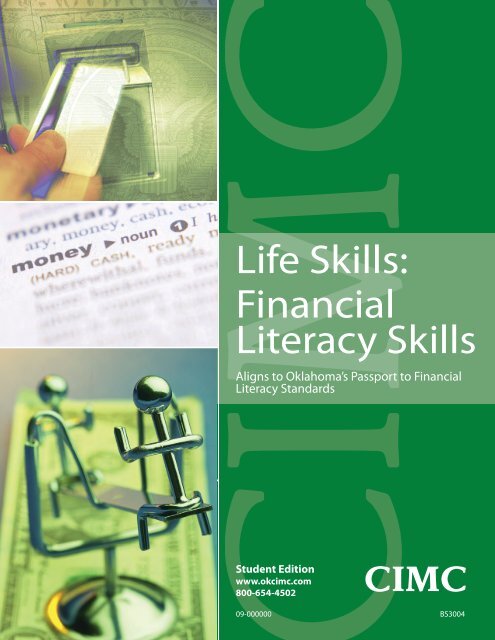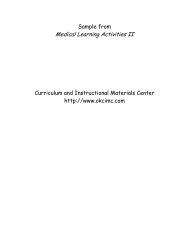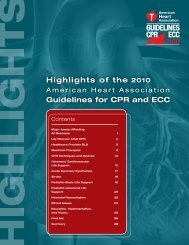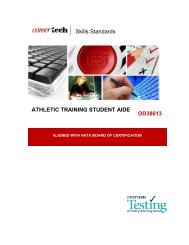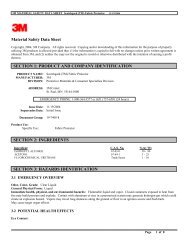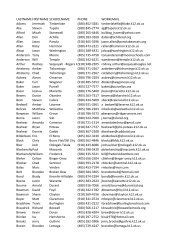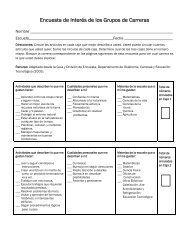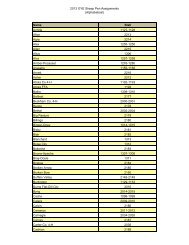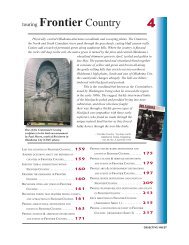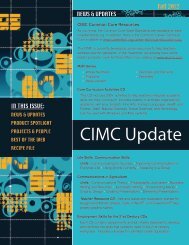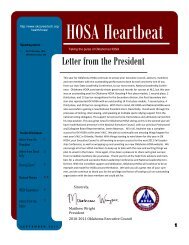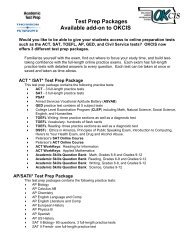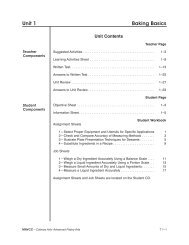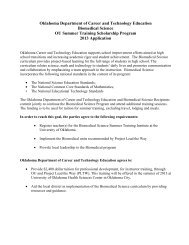Student Workbook (PDF file, 3.46 MB) - Oklahoma Department of ...
Student Workbook (PDF file, 3.46 MB) - Oklahoma Department of ...
Student Workbook (PDF file, 3.46 MB) - Oklahoma Department of ...
You also want an ePaper? Increase the reach of your titles
YUMPU automatically turns print PDFs into web optimized ePapers that Google loves.
IMC<br />
Life Skills:<br />
Financial<br />
Literacy Skills<br />
Aligns to <strong>Oklahoma</strong>’s Passport to Financial<br />
Literacy Standards<br />
<strong>Student</strong> Edition<br />
www.okcimc.com<br />
800-654-4502<br />
09-000000<br />
CIMC<br />
BS3004
LIFE SKILLS:<br />
FINANCIAL LITERACY SKILLS<br />
STUDENT EDITION<br />
Developed by the<br />
Curriculum and Instructional Materials Center<br />
<strong>Oklahoma</strong> <strong>Department</strong> <strong>of</strong> Career and Technology Education<br />
09-00000 BS3004
Copyright 2009<br />
<strong>Oklahoma</strong> <strong>Department</strong> <strong>of</strong> Career and Technology Education<br />
Curriculum and Instructional Materials Center<br />
All rights reserved.<br />
Printed in the United States <strong>of</strong> America by the<br />
<strong>Oklahoma</strong> <strong>Department</strong> <strong>of</strong> Career and Technology Education<br />
Stillwater, <strong>Oklahoma</strong> 74074-4364<br />
This publication, or parts there<strong>of</strong>, may not be reproduced in any form by photographic, electrostatic,<br />
mechanical, or any other methods for any use including information storage and retrieval,<br />
without written permission from the publisher.<br />
Web site addresses were accurate and all content on referenced web sites was appropriate<br />
during development and production <strong>of</strong> this product. However, web sites sometimes change;<br />
the CIMC takes no responsibility for a site’s content. The inclusion <strong>of</strong> a web site does not constitute<br />
an endorsement <strong>of</strong> that site’s other pages, products, or owners. You are encouraged to<br />
verify all web sites prior to use.<br />
The <strong>Oklahoma</strong> <strong>Department</strong> <strong>of</strong> Career and Technology Education does not discriminate on the<br />
basis <strong>of</strong> race, creed, color, national origin, sex, age, veteran status, or qualified handicap.
TABLE OF CONTENTS<br />
Unit 1: MANAGING MONEY<br />
Unit 2: UNDERSTANDING BANKING<br />
Unit 3: USING CREDIT WISELY<br />
Unit 4: UNDERSTANDING TAXES AND INSURANCE<br />
Unit 5: Understanding Investing and Home Ownership<br />
Unit 6: Understanding Consumer Fraud and Identity Theft
Unit 1<br />
MANAGING MONEY<br />
To manage money with sense, you need to learn to apply<br />
basic money management skills. These skills include fi nding<br />
a career that can support the lifestyle you choose and making<br />
wise decisions about how you spend and save.<br />
UNIT 1 MANAGING MONEY 1
Unit 1<br />
SPECIFIC OBJECTIVES<br />
1. Identify trends in career opportunities.<br />
2. List sources for career information.<br />
3. Research careers <strong>of</strong> interest. (Assignment Sheet 1)<br />
4. State guidelines for pricing a job <strong>of</strong>fer.<br />
5. Identify ways to earn and save money.<br />
6. Distinguish between fi xed and variable expenses.<br />
7. List the basic steps in a fi nancial plan.<br />
8. Summarize three methods <strong>of</strong> managing personal fi nances.<br />
9. State guidelines for using a budget.<br />
10. Develop a budget. (Assignment Sheet 2)<br />
11. Analyze budgeting case studies. (Assignment Sheet 3)<br />
12. Apply money management principles. (Assignment Sheet 4)<br />
13. Calculate and compare unit prices <strong>of</strong> consumable items.<br />
(Assignment Sheet 5)<br />
14. List items deducted by law from a paycheck.<br />
15. List items deducted by request from a paycheck.<br />
16. List benefi ts <strong>of</strong>ten refl ected in a paycheck.<br />
17. Explain how games <strong>of</strong> chance work.<br />
18. Compare the costs and benefi ts <strong>of</strong> gambling.<br />
19. Identify types <strong>of</strong> charitable giving.<br />
20. Discuss the impact <strong>of</strong> charitable giving.<br />
21. Research a charitable organization. (Assignment Sheet 6)<br />
2 LIFE SKILLS: FINANCIAL LITERACY SKILLS — STUDENT EDITION
OBJECTIVE 1<br />
Identify trends in career opportunities.<br />
The following list represents projections from the Bureau <strong>of</strong> Labor<br />
Statistics. The fastest-growing occupations may not provide the<br />
largest number <strong>of</strong> jobs. Compare job<br />
growth in terms <strong>of</strong> percent change<br />
and numerical change. A larger<br />
occupation with slower growth may<br />
create more job openings than<br />
a smaller occupation with faster<br />
growth.<br />
The labor force will grow more<br />
slowly.<br />
The labor force will become<br />
more diverse.<br />
Women’s share <strong>of</strong> the labor force will slowly increase.<br />
The number <strong>of</strong> men in the labor force will grow at a slower<br />
rate than in the past.<br />
NOTE: This will happen for many reasons. One cause will<br />
be declining employment in well-paid production jobs in<br />
manufacturing. Another cause will be the continued shift in<br />
demand for workers away from producing goods and toward<br />
producing services.<br />
The labor force will become older.<br />
Service-producing industries will have the highest employment<br />
growth.<br />
Construction employment will grow more slowly than during<br />
the previous 10-year period.<br />
Employment growth in agriculture services and forestry<br />
will be higher than in crops, livestock, and livestock-related<br />
products.<br />
UNIT 1 MANAGING MONEY 3
Replacement needs will account for three-fi fths <strong>of</strong> the projected<br />
job openings.<br />
NOTE: Extra job openings result when workers who leave the<br />
occupation must be replaced. For example, some workers<br />
leave because they are promoted, change careers, go back<br />
to school, stay home to care for relatives, retire, or other<br />
reasons. Occupations that combine low pay and low training<br />
requirements with a high proportion <strong>of</strong> young and part-time<br />
workers have greater replacement needs.<br />
Service and pr<strong>of</strong>essional specialty occupations will provide<br />
about 2 <strong>of</strong> every 5 job openings.<br />
Computer-related occupations and teachers will account for<br />
15 percent <strong>of</strong> all new jobs.<br />
Replacement needs will create job openings in agriculture,<br />
forestry, fi shing, and related occupations.<br />
Offi ce automation will affect many administrative and clerical<br />
support occupations. These occupations will increase more<br />
slowly than average; some will decline.<br />
Precision production, craft, and repair occupations and<br />
operators, fabricators, and laborers will grow slower than<br />
average. This is due to advances in technology, changes in<br />
production methods, and an overall decline in manufacturing<br />
jobs.<br />
The fastest-growing occupations refl ect growth in computer<br />
technology and health care services.<br />
Computer engineers<br />
and systems analysts<br />
jobs will grow rapidly.<br />
This is due to the<br />
needs <strong>of</strong> scientifi c<br />
research and the<br />
applications <strong>of</strong><br />
computer technology.<br />
4 LIFE SKILLS: FINANCIAL LITERACY SKILLS — STUDENT EDITION
Many factors will contribute to the<br />
growth in health care services.<br />
These factors include: an aging<br />
population requiring more services,<br />
increased use <strong>of</strong> innovative medical<br />
technology for diagnosis and<br />
treatment, and shorter hospital stays<br />
to manage costs.<br />
Job growth varies widely by education and training<br />
requirements. However, education is essential in getting a highpaying<br />
job.<br />
OBJECTIVE 2<br />
List sources for career information.<br />
Career consultants<br />
Counselors<br />
NOTE: You can fi nd counselors in many places. For example,<br />
look in school guidance <strong>of</strong>fi ces, in school career planning<br />
and placement <strong>of</strong>fi ces, in community organizations, in private<br />
counseling agencies and<br />
private practices, and in state<br />
employment service <strong>of</strong>fi ces.<br />
Educational institutions<br />
Employers<br />
Internet networks and resources<br />
Personal contacts<br />
EXAMPLE: Parents, family members, friends and<br />
acquaintances, and neighbors may be able to answer your<br />
questions about careers. If not, they may be able to put you in<br />
touch with somebody who can.<br />
UNIT 1 MANAGING MONEY 5
Pr<strong>of</strong>essional societies and journals.<br />
Public libraries, career centers, and guidance <strong>of</strong>fi ces<br />
Trade associations and magazines<br />
OBJECTIVE 3<br />
Complete Assignment Sheet 1.<br />
OBJECTIVE 4<br />
State guidelines for pricing a job <strong>of</strong>fer.<br />
How would you compare these two job <strong>of</strong>fers?<br />
Job 1: $43,000/year, 9-to-5 schedule, two weeks’ paid vacation<br />
and a great health plan<br />
Job 2: $62,500/year, 7-to-7 schedule, no paid vacation time, a<br />
basic retirement plan, and on-site child care<br />
The answer depends on what is important to you. So how do you<br />
fi gure out what really matters? And then what do you do about it?<br />
Set your personal priorities — Decide what is important to you.<br />
Then, you will have a basis for evaluating job <strong>of</strong>fers. For example,<br />
consider child care benefi ts, travel opportunities, location, fl exible<br />
working hours, health plans, the organization’s “culture,” training and<br />
personal growth opportunities, potential for advancement, and other<br />
features or benefi ts.<br />
6 LIFE SKILLS: FINANCIAL LITERACY SKILLS — STUDENT EDITION
Compare the dollar value <strong>of</strong> the job <strong>of</strong>fer to your current job<br />
or to other <strong>of</strong>fers — Total the dollar value <strong>of</strong> the salary plus the<br />
benefi ts. Add the value <strong>of</strong> other benefi ts and savings. For example, a<br />
fl exible work schedule could allow<br />
you to save money on child care<br />
or keep you from using vacation<br />
days to care for aging parents.<br />
Depending on your health, a good<br />
health plan could save you a lot <strong>of</strong><br />
money. If your job does not <strong>of</strong>fer<br />
these benefi ts, what would it cost to<br />
purchase them on your own?<br />
Be realistic about negotiating —<br />
Some benefi ts may be negotiable,<br />
while others are not. Medical<br />
benefi ts and employer contributions<br />
to retirement plans, like 401(k)s, are probably not negotiable.<br />
Benefi ts such as expense accounts, parking privileges, working<br />
from home (“telecommuting”), and others might be more open to<br />
discussion, especially in a smaller organization.<br />
Calculate your value and your contribution to the organization<br />
in advance — Find the current salary range for a given job, and<br />
learn how your level <strong>of</strong> education and/or experience will infl uence<br />
your value. Check newspaper listings, pr<strong>of</strong>essional organizations,<br />
Internet links to reliable salary surveys, and other sources. Never<br />
negotiate based on what you need – potential employers do not<br />
care that you have student loans to pay <strong>of</strong>f, so do not bring up your<br />
expenses. Negotiate based on what you are worth – emphasize your<br />
knowledge and skills in the area.<br />
UNIT 1 MANAGING MONEY 7
OBJECTIVE 5<br />
Identify ways to earn and save money.<br />
The rule to saving is “Live below your means.” In other<br />
words, do not spend every penny you make. Pay yourself first,<br />
before the credit card company, the bank, and the finance<br />
company. Pay yourself by saving in a way that will grow to<br />
become the “nest egg” you want for future use.<br />
Create a realistic spending plan and stick to it. It may<br />
need occasional adjusting when a situation changes in<br />
your life, but practice discipline in sticking to your plan.<br />
Stop impulsive buying. Never buy until you’ve had time to<br />
determine how this expense will fit into your spending plan.<br />
If it doesn’t, don’t buy.<br />
Reconsider any purchase over a certain amount (for example,<br />
$20). Ask yourself, do I really need this? Set a number <strong>of</strong> days that<br />
you wait before you purchase. This is especially true <strong>of</strong> big-ticket<br />
items. Your answer will probably be no.<br />
Do purchase<br />
medical<br />
insurance and<br />
vehicle collision<br />
insurance, but<br />
be very selective<br />
about other<br />
insurance.<br />
Charge items<br />
only if you can<br />
afford to pay for<br />
them now. Do not<br />
count on overtime<br />
pay, a raise, or an<br />
inheritance.<br />
8 LIFE SKILLS: FINANCIAL LITERACY SKILLS — STUDENT EDITION
Put away your credit cards for a week or so a month and live<br />
without them. You might be less tempted to spend.<br />
Never co-sign or guarantee a loan for someone<br />
or assume a joint debt with someone who<br />
has a shaky financial history. You may end up<br />
responsible for someone else’s debts.<br />
Do not make high-risk investments such as<br />
speculative real estate or junk bonds. Also place your<br />
investment with someone who is qualified and reputable. There is<br />
no free lunch. Savings requires discipline, not luck.<br />
Let your savings work for you; leave earnings in accounts so<br />
they will grow faster and have more principle to earn interest.<br />
Remove money only in an emergency. Take advantage <strong>of</strong> any<br />
matching savings plans your company has.<br />
Shop for the smartest investments, such as interest-earning<br />
checking accounts. Look for the highest interest on certificates <strong>of</strong><br />
deposits, the most return for the lowest premium in insurance, and the<br />
best value for your consumer dollar when shopping for products and<br />
services. Do your pre-shopping and pre-investing research.<br />
Diversify. Because your piggy bank earns no interest, let it rest<br />
while you spread your investments around—stable stocks for higher<br />
earnings, mutual funds for representation in many kinds <strong>of</strong> businesses,<br />
bonds for regular but low earnings, and certificates <strong>of</strong> deposit with low<br />
but guaranteed earnings.<br />
Find alternatives to spending. Instead <strong>of</strong> dinner out, pack a picnic<br />
and take it to the park; instead <strong>of</strong> buying a CD or book, borrow it<br />
from your local library. Saving on everyday expenditures—carrying<br />
your lunch a few days each week,<br />
sharing rides, and recycling<br />
computer paper are only a few<br />
ways to turn pennies into dollars.<br />
UNIT 1 MANAGING MONEY 9
Earn money whenever you can. This might mean<br />
seasonal work or part-time work such as yard<br />
work, pool care, or farm labor, or a second<br />
part-time job such as house sitting, church<br />
janitor, or school bus driver. These jobs<br />
not only put money in your savings, they<br />
also build your résumé.<br />
Use your own time, ability, and talent to<br />
perform as many tasks around the<br />
house and personal grooming tasks<br />
as you can.<br />
Keep in mind that it is smarter to earn interest<br />
than to pay interest. By saving and investing wisely, you can be the<br />
lender, not the borrower.<br />
OBJECTIVE 6<br />
Distinguish between fixed and variable expenses.<br />
NOTE: Read <strong>Student</strong> Supplements 2 and 3.<br />
Fixed expenses — A fixed<br />
expense is a set amount <strong>of</strong><br />
money due on a set date. As a<br />
rule, fixed expenses must be<br />
paid when due. Fixed expenses<br />
do not allow for short-term<br />
budget adjustments, since you<br />
cannot decide to pay less at any<br />
particular time. Fixed expenses<br />
include:<br />
Rent or mortgage<br />
payments — If you have a<br />
mortgage, your property tax and homeowner’s insurance may<br />
be included in your house payment. Other real estate payments<br />
may include homeowner association fees or maintenance fees.<br />
10 LIFE SKILLS: FINANCIAL LITERACY SKILLS — STUDENT EDITION
Taxes — Different types <strong>of</strong> taxes include income taxes (federal<br />
and state), sales and excise taxes, and personal property taxes<br />
(this is different from your property tax and is not included in<br />
house payments).<br />
Loans — Most loans are installment loans, used to buy items<br />
such as cars, furniture, appliances, etc.<br />
Leases — Some people lease items such as furniture or<br />
electronics on a “rent to own” basis.<br />
Insurance — Some insurance payments (such as health<br />
insurance) are taken directly out <strong>of</strong> your paycheck, but others<br />
must be paid separately, such as auto insurance or renter’s<br />
insurance.<br />
Regular payments to others — These may include alimony,<br />
child support, or loans from family or friends.<br />
Regular contributions — People may make regular<br />
contributions to their church or to charities.<br />
Dues — You may pay dues to a union, a club, or a pr<strong>of</strong>essional<br />
organization.<br />
Regular savings — It is important to consider savings a regular,<br />
planned expense. Five to ten percent <strong>of</strong> your income should be<br />
put into savings.<br />
Variable expenses — A variable expense is one that changes in<br />
amount and frequency. Variable expenses <strong>of</strong>ten give you a good<br />
opportunity to make adjustments in your living expenses.<br />
Utilities — Utilities include gas, electricity, telephone, water,<br />
garbage, sewage, and cable or satellite television. Some utilities<br />
(such as electricity and water) may be included in your rent, but<br />
others must be paid separately.<br />
Charge accounts/credit cards — You may have a charge<br />
account at a local store, or a major credit card.<br />
Medical and dental bills — You are responsible for the portion<br />
<strong>of</strong> these expenses that are not covered by insurance.<br />
UNIT 1 MANAGING MONEY 11
Transportation — While car<br />
payments are a fi xed expense,<br />
variable expenses include gas,<br />
maintenance, and repairs. Public<br />
transportation, such as train or<br />
bus fares, can also be a variable<br />
expense.<br />
Food — Groceries and dining out<br />
make up your food expenses.<br />
Non-regular savings — In addition to your regular savings<br />
account, you may have a special account earmarked for a<br />
special purpose, such as a down payment for a house or car.<br />
Other items — Clothing, vacations, education, entertainment,<br />
toiletries, gifts, and other expenses that do not come up on a<br />
regular basis must also be included in your budget.<br />
12 LIFE SKILLS: FINANCIAL LITERACY SKILLS — STUDENT EDITION
OBJECTIVE 7<br />
List the basic steps in a financial plan.<br />
A fi nancial plan is a broad<br />
strategy for handling your<br />
fi nances. It should include<br />
both short-term and long-term<br />
goals. A fi nancial plan helps<br />
you make the most <strong>of</strong> your<br />
money, regardless <strong>of</strong> your<br />
economic circumstances.<br />
Establish your financial<br />
goals.<br />
Decide what you want<br />
your money to do for you.<br />
Determine what style <strong>of</strong> living you wish to achieve.<br />
List savings objectives.<br />
Estimate and total your income.<br />
Determine how much money you receive from all sources for the<br />
plan period—earnings, gifts, bonuses, interest on savings, and<br />
allowance.<br />
Estimate and total your expenses.<br />
List all your expenses, separating them into fi xed and variable<br />
expenses.<br />
Add these expenses to determine how much money you spend<br />
during each plan period.<br />
UNIT 1 MANAGING MONEY 13
Analyze your current income and spending.<br />
Carefully examine the amounts you estimated for both income and<br />
expenses. Overestimating income and underestimating expenses<br />
is very easy to do and can cause big problems for your budget.<br />
Subtract your expenses from your income for each plan period.<br />
If you come out even or need extra money, consider ways to<br />
increase your income or cut your expenses. If you have extra<br />
money, decide how you want to apply it toward your savings goal.<br />
Prepare a trial financial plan.<br />
A written plan listing your goals, your income, and your<br />
expenses reduces the temptation to overspend or spend<br />
carelessly.<br />
Put your fi nancial plan into writing.<br />
Revise your plan and update it on a regular basis.<br />
Put your plan into action and keep organized records.<br />
Keep track <strong>of</strong> your spending and savings.<br />
Evaluate your financial plan periodically.<br />
Whenever your income, expenses, or goals change signifi cantly,<br />
review your plan to see if you need to make any changes.<br />
Signifi cant events all have an impact on your fi nancial plan.<br />
These may include graduating, going to college, starting a new<br />
job, moving, marrying, having children, changing jobs, divorcing,<br />
or death.<br />
14 LIFE SKILLS: FINANCIAL LITERACY SKILLS — STUDENT EDITION
OBJECTIVE 8<br />
Summarize three methods <strong>of</strong> managing personal<br />
finances.<br />
PREVENTION<br />
Develop good savings habits.<br />
Practice sound money<br />
management.<br />
Use credit wisely.<br />
Purchase enough insurance<br />
protection.<br />
Use reasonable caution in fi nancial matters.<br />
PREPARATION<br />
Get a good education to be better able to fi nd a job.<br />
Learn marketable job skills to advance on the job.<br />
Stay current in your fi eld to earn promotions and pay raises.<br />
Establish an emergency fund equal to three to six months’ pay<br />
to give you time to assess the crisis and take action.<br />
Regulate your life style to live below your income level in case<br />
you need to meet unexpected expenses or must live on a lower<br />
income.<br />
UNIT 1 MANAGING MONEY 15
COPING WITH FINANCIAL CHALLENGES<br />
Accept that your fi nancial crisis is real — it will not go away on<br />
its own.<br />
If you are in debt, contact your creditors immediately to arrange<br />
for payment plans — do not wait until you have missed payments.<br />
Avoid making any new credit purchases.<br />
Find free or inexpensive fi nancial counseling.<br />
Adjust your spending habits and cut expenses.<br />
Encourage additional family members to look for employment.<br />
Look into sources <strong>of</strong> assistance from employers, insurance,<br />
government programs, and community and charitable<br />
organizations.<br />
Consider selling items such as real estate, jewelry, investments,<br />
automobiles, and other valuable possessions. Even books, CDs,<br />
and clothing can be sold.<br />
16 LIFE SKILLS: FINANCIAL LITERACY SKILLS — STUDENT EDITION
OBJECTIVE 9<br />
State guidelines for using a budget.<br />
Your budget is an important part <strong>of</strong> your fi nancial plan, because it<br />
will help you reach the goals you have set in your fi nancial plan.<br />
A budget may also be known as a<br />
spending plan.<br />
1. Determine your goals.<br />
2. Estimate your income.<br />
3. Estimate your expenses for this<br />
pay period, as well as the amount<br />
you will need to put away for<br />
future expenses (such as car<br />
repairs or savings for a vacation).<br />
4. Earmark money available for<br />
expenses.<br />
5. Spend money according to your budget.<br />
6. Regularly compare your estimated expenses to your actual<br />
spending.<br />
7. Evaluate your budget and revise as needed.<br />
OBJECTIVE 10<br />
Complete Assignment Sheet 2.<br />
UNIT 1 MANAGING MONEY 17
OBJECTIVE 11<br />
Complete Assignment Sheet 3.<br />
OBJECTIVE 12<br />
Complete Assignment Sheet 4.<br />
OBJECTIVE 13<br />
Complete Assignment Sheet 5.<br />
18 LIFE SKILLS: FINANCIAL LITERACY SKILLS — STUDENT EDITION
OBJECTIVE 14<br />
List items deducted by law from a paycheck.<br />
The following items are deducted from<br />
your paycheck according to various<br />
state and federal laws. The amount<br />
deducted is usually a percentage <strong>of</strong><br />
your income — the more you make,<br />
the more you will have deducted.<br />
Social Security (FICA) —<br />
Social Security began in 1935<br />
as a retirement and disability<br />
insurance program. The money<br />
deducted from worker’s paychecks for Social Security also<br />
provides health care for certain people who are older and/<br />
or have disabilities or low income (Medicare and Medicaid).<br />
Your Social Security deduction will be listed as FICA on your<br />
paycheck – this stands for Federal Insurance Contributions Act,<br />
the law that says how these funds are collected and used.<br />
Unemployment insurance (federal and state) — Workers who<br />
lose their jobs may be able to collect money from a special fund.<br />
This money comes from deductions from workers’ paychecks.<br />
Workers’ Compensation — People who are injured on the job<br />
and are unable to work may be able to collect money from a<br />
special fund. This money comes from deductions from workers’<br />
paychecks.<br />
Federal income tax — Federal income taxes are due to be<br />
paid every year. The amount <strong>of</strong> tax you must pay is based on<br />
your income and other factors. Most workers have a certain<br />
amount deducted from each paycheck. This amount is called<br />
“withholding.” Unlike other deductions, withholding can be<br />
adjusted by the worker – you can ask to have more or less taken<br />
out <strong>of</strong> your check, depending on the amount <strong>of</strong> taxes you expect<br />
to owe at the end <strong>of</strong> the year. If the amount <strong>of</strong> federal income tax<br />
withheld from your check is more than the amount you actually<br />
owe, you will receive a refund. If you do not have enough<br />
withheld, you will have to pay extra at the end <strong>of</strong> the tax year.<br />
UNIT 1 MANAGING MONEY 19
State and city income tax — Many states and cities also<br />
withhold a certain amount for income taxes. Like federal income<br />
taxes, the amount you owe is based on your income and other<br />
factors, and you will receive a refund if the amount withheld is<br />
more than you owe.<br />
OBJECTIVE 15<br />
List items deducted by request from a paycheck.<br />
You may choose to have the following<br />
items deducted from your paycheck if<br />
your employer makes them available:<br />
Labor union dues<br />
Group insurance plans (health and/<br />
or life insurance for yourself and<br />
your family)<br />
Savings account (money can be<br />
deposited directly into your savings<br />
account at your bank)<br />
Flexible spending account (funds<br />
set up to pay for medical or child care expenses with “pre-tax”<br />
dollars to reduce income taxes)<br />
Investments<br />
Retirement plans (such as a 401(k) plan or group pension plan)<br />
20 LIFE SKILLS: FINANCIAL LITERACY SKILLS — STUDENT EDITION
OBJECTIVE 16<br />
List benefits <strong>of</strong>ten reflected in a paycheck.<br />
Health insurance — Your employer may pay all or part <strong>of</strong> the<br />
health insurance premium for you and your family members.<br />
Life insurance — Your employer may pay all or part <strong>of</strong> the<br />
health insurance premium for you and your family members.<br />
Tax sheltered investments — You may choose to have money<br />
deducted from your paycheck and invested in stocks, bonds, or<br />
other securities. These are called “tax sheltered” because you<br />
do not pay income tax on this part <strong>of</strong> your income until you take<br />
the money out <strong>of</strong> the investments, which generally occurs after<br />
you retire.<br />
Sick leave — Your employer may choose to pay<br />
you for a certain number <strong>of</strong> days when you are<br />
too sick to work.<br />
Annual leave, vacation time, or personal time<br />
— Many employers allow their employees to take<br />
a certain number <strong>of</strong> days <strong>of</strong>f every year while still<br />
receiving pay.<br />
Holiday leave or holiday pay — Your employer may pay you<br />
even when you do not work due to a holiday. You may also be<br />
paid extra for working on certain holidays.<br />
Workers’ compensation and unemployment compensation<br />
— Workers who lose their jobs due to injury or other reasons<br />
may be able to collect a partial paycheck.<br />
Retirement (group pension plans) — Your employer may<br />
contribute to a retirement plan that will provide income after you<br />
stop working.<br />
Pr<strong>of</strong>it-sharing and stock purchase programs — Some<br />
employers split a share <strong>of</strong> their pr<strong>of</strong>i ts with their employees, or<br />
make it easier for employees to buy shares <strong>of</strong> their company.<br />
UNIT 1 MANAGING MONEY 21
OBJECTIVE 17<br />
Explain how games <strong>of</strong> chance work.<br />
WORDS YOU SHOULD KNOW<br />
gambling<br />
random<br />
paying money to play a game for the opportunity to<br />
win a prize (also known as “gaming”)<br />
not planned, not following a particular pattern<br />
A “game <strong>of</strong> chance” is a game whose outcome depends on a<br />
random event. The random event might come from a throw <strong>of</strong><br />
the dice or a fl ip <strong>of</strong> a coin. Unlike games <strong>of</strong> skill (such as sports)<br />
or knowledge (such as trivia games), there is nothing a player<br />
can do to increase your odds <strong>of</strong> winning a game <strong>of</strong> chance. Some<br />
games involve both chance and skill, such as certain card games<br />
and board games. Many games <strong>of</strong> chance are used in gambling,<br />
including slot machines and lottery tickets.<br />
In a truly random game <strong>of</strong> chance, the player has a fairly consistent<br />
chance <strong>of</strong> winning. For example, every time you fl ip a coin, there<br />
is a 50% chance that it will come up<br />
“heads.” Every time you roll a six-sided<br />
die, there is a 1 in 6 (or 16.7%) chance<br />
that any particular number will come up.<br />
However, the games <strong>of</strong> chance used in<br />
gambling are not always truly random.<br />
For example, modern slot machines<br />
are programmed to let the player win<br />
a certain percentage <strong>of</strong> the time. The<br />
only random aspect is who happens to<br />
be sitting at the machine at the time. In lotteries, a limited number<br />
<strong>of</strong> winning scratch-<strong>of</strong>f tickets are distributed randomly throughout<br />
all tickets printed. In this case, the distribution <strong>of</strong> winning tickets is<br />
random, but the number <strong>of</strong> winning tickets and amount <strong>of</strong> money that<br />
can be won is carefully planned.<br />
In general, when gambling, the odds are against the player.<br />
Individuals will occasionally get lucky and win more than they spent,<br />
but in the long run, the casino or lottery always wins.<br />
22 LIFE SKILLS: FINANCIAL LITERACY SKILLS — STUDENT EDITION
OBJECTIVE 18<br />
Compare the costs and benefits <strong>of</strong> gambling.<br />
BENEFITS OF GA<strong>MB</strong>LING<br />
Gambling creates jobs for people who work in the gambling<br />
industry. Gambling can also provide jobs for those who work in<br />
associated industries, such as hotels and restaurants that may<br />
be built near casinos.<br />
Income from gambling may<br />
be used to benefi t society. For<br />
example, in <strong>Oklahoma</strong>, income<br />
from the state lottery is used to<br />
support public education.<br />
Gambling provides<br />
entertainment for many people.<br />
COSTS OF GA<strong>MB</strong>LING<br />
Gambling can be an addiction,<br />
and like any addictive behavior,<br />
it can cause people to lose money, jobs, etc.<br />
Even people who are not addicted to gambling can easily spend<br />
more than they can afford to lose.<br />
Gambling can increase crime. According to one study, crime<br />
increased 8% in counties with casinos over four years,<br />
compared to counties without casinos.<br />
UNIT 1 MANAGING MONEY 23
OBJECTIVE 19<br />
Identify types <strong>of</strong> charitable giving.<br />
Monetary donations<br />
— Many people choose<br />
to donate money to the<br />
charities <strong>of</strong> their choice.<br />
Volunteer service —<br />
Your time and expertise<br />
can be extremely<br />
valuable to a charitable<br />
organization. This kind<br />
<strong>of</strong> donation might include<br />
making phone calls, designing posters and fl yers, etc. According<br />
to the National Center for Charitable Statistics, approximately<br />
28.8 percent <strong>of</strong> Americans over the age <strong>of</strong> 16 volunteered some<br />
<strong>of</strong> their time in 2005.<br />
Gifts-in-kind — Instead <strong>of</strong> giving money to buy what an<br />
organization needs, you may choose to give necessary items<br />
instead. Non-cash gifts can be large and expensive (such as<br />
equipment) or inexpensive (such as items <strong>of</strong> clothing). The items<br />
can be new or used, as long as they are still in good useable<br />
condition.<br />
24 LIFE SKILLS: FINANCIAL LITERACY SKILLS — STUDENT EDITION
OBJECTIVE 20<br />
Discuss the impact <strong>of</strong> charitable giving.<br />
The most obvious impact <strong>of</strong> charitable giving is the fact that it helps<br />
those who receive benefi ts. But there are other impacts as well.<br />
Tax benefits — For many people and organizations, charitable<br />
donations are tax deductible.<br />
Personal satisfaction — Giving time or resources to a charity<br />
helps you feel good about yourself.<br />
Creation <strong>of</strong> jobs — Charitable organizations create jobs for<br />
many people. In 2004, nonpr<strong>of</strong>i t organizations (including public<br />
charities and private foundations) accounted for over 8% <strong>of</strong> the<br />
wages and salaries paid in the U.S.<br />
Reducing waste — Giving used or surplus items to those who<br />
can use them keeps those items out <strong>of</strong> landfi lls.<br />
Benefit to the community — When you support a charity, your<br />
support can help your community as well. For example, if you<br />
donate to an organization that provides training to people who<br />
have lost their jobs, not only do the unemployed people receive<br />
a benefi t, but your community benefi ts from taxes and spending<br />
ability once they fi nd new jobs.<br />
OBJECTIVE 21<br />
Complete Assignment Sheet 6.<br />
UNIT 1 MANAGING MONEY 25
26 LIFE SKILLS: FINANCIAL LITERACY SKILLS — STUDENT EDITION
ASSIGNMENT SHEET 1<br />
Research careers <strong>of</strong> interest.<br />
Name __________________________________ Score __________<br />
Before making a decision about a career, it is important to research it<br />
well. Sometimes there is more to a job than you realize. Sometimes<br />
people see only the glamorous side <strong>of</strong> a career and fail to see what<br />
goes on behind the job title. Aside from the more typical problems<br />
such as long hours or extensive travel, a job may have health<br />
hazards associated with it. Or you may simply fi nd that the job you<br />
are interested in does not pay as well as you thought, or has very<br />
few job openings. Researching a career now may save you from<br />
surprises in the future.<br />
Instructions: Using a variety<br />
<strong>of</strong> resources such as government<br />
publications, online resources, trade<br />
journals, magazines and newspapers,<br />
personal interviews, etc., research<br />
You Will Need<br />
• Pen or pencil<br />
• Research materials<br />
the career areas you are interested in. You may choose to use the<br />
Occupational Outlook Handbook online at www.bis.gov.oco/home.<br />
htm. Answer the questions below.<br />
1. Select three careers that interest you and list them below.<br />
2. Why do these careers interest you?<br />
UNIT 1 MANAGING MONEY 27
3. What education requirements and/or special qualifi cations are<br />
needed for these careers?<br />
4. What is the job outlook for these careers?<br />
5. What is the salary range for each career?<br />
6. Which <strong>of</strong> the three careers are you most interested in, and why?<br />
Give at least 5 reasons.<br />
28 LIFE SKILLS: FINANCIAL LITERACY SKILLS — STUDENT EDITION
ASSIGNMENT SHEET 2<br />
Develop a budget.<br />
Name __________________________________ Score __________<br />
Do you ever wonder where your money goes? Sometimes you know<br />
the answer. When you pay fixed expenses, such rent or other bills,<br />
or if you’ve saved your money to make a special purchase, then you<br />
know exactly how much money you’ve spent. When you buy food or<br />
pay for movies, CDs, and other things, you might have a harder time<br />
keeping track <strong>of</strong> how much you spent. A budget, or spending plan,<br />
can give you more control over your expenses. Over a period <strong>of</strong> time,<br />
it can show you not only where you are today financially, but can also<br />
identify trends or patterns in your spending. Knowing this information<br />
can help you to improve your personal financial well-being.<br />
Instructions:<br />
On a separate sheet <strong>of</strong> paper, list<br />
the categories <strong>of</strong> your weekly or<br />
monthly expenses (savings, food,<br />
clothing, etc.). List your categories<br />
in a column down the left side <strong>of</strong> the paper.<br />
You Will Need<br />
• Pen or pencil<br />
• Calculator<br />
(optional)<br />
At the top <strong>of</strong> your sheet list the total amount <strong>of</strong> money you will<br />
have available to save and spend for the week or month.<br />
To the right <strong>of</strong> each expense category, record the amount <strong>of</strong><br />
money you plan to spend during the week or month.<br />
Record your actual expenses for each category during the month.<br />
At the end <strong>of</strong> the week or month, calculate the total spent for each<br />
category. Record the totals beside the amount you planned to<br />
spend in each category. Then answer the following questions:<br />
1. Total your expenses for the week or month. Was the balance<br />
positive or negative?<br />
UNIT 1 MANAGING MONEY 29
2. Study your totals. How <strong>of</strong>ten did you spend less than you<br />
planned? How <strong>of</strong>ten did you spend more?<br />
3. What have you learned about your spending habits?<br />
4. What have you learned about the importance <strong>of</strong> budgeting and<br />
tracking your spending?<br />
30 LIFE SKILLS: FINANCIAL LITERACY SKILLS — STUDENT EDITION
ASSIGNMENT SHEET 3<br />
Analyze budgeting case studies.<br />
Name __________________________________ Score __________<br />
Difficult decisions must <strong>of</strong>ten be made when you cannot afford all <strong>of</strong><br />
your needs and wants. If you cannot pay for all <strong>of</strong> your goals, you will<br />
need to either adjust your financial plan, or compromise on your goals.<br />
Instructions: Read the following<br />
You Will Need<br />
cases, and answer the questions that • Pen or pencil<br />
follow.<br />
• Calculator<br />
(optional)<br />
Jana makes $8.50 per hour and takes<br />
home $1356 per month. She spends<br />
$300 per month for rent, $160 per month on gas and car upkeep, $325<br />
per month on food and beverages, $100 per month on clothing, $85<br />
per month on furniture payments, and $80 per month on household<br />
operation. She also deposits $150 into her savings account. For the<br />
past three months, Jana has had to spend about $130 per month in<br />
car repairs; her mechanic says the car will need another $1000 <strong>of</strong><br />
work over the next few months. Jana wonders if she would be better<br />
<strong>of</strong>f buying a new car that did not need such expensive repairs.<br />
1. Can Jana afford a new car payment <strong>of</strong> $245 per month with her<br />
current budget?<br />
2. If she buys the new car, what adjustments would she need to<br />
make in her current budget?<br />
UNIT 1 MANAGING MONEY 31
3. What would you recommend?<br />
Wayne has been saving money to buy a boat for fi shing, skiing,<br />
and general recreation. He has saved $4000 so far, but the boat he<br />
wants costs $12,500. If he uses his $4000 as a down payment, his<br />
payments would be $178 per month for the next four years. Wayne’s<br />
current budget is:<br />
Monthly salary: $1800<br />
Mortgage: $325<br />
Car and transportation: $235<br />
Food, etc.: $440<br />
Household operation: $130<br />
Furniture and housing equipment: $120<br />
Clothing: $160<br />
Savings: $150<br />
4. Can Wayne afford the boat payment and stay within his budget<br />
as listed above?<br />
5. If you were Wayne would you buy the boat? Why or why not?<br />
Alfonso wants to get married. He earns $14,500 a year; his fi ancé<br />
earns $12,500 a year. He wants them to move out <strong>of</strong> their parents’<br />
homes into a rented apartment. He has just started to compile a list<br />
<strong>of</strong> expenses they will encounter as newlyweds.<br />
6. What items should be included in Alfonso’s budget?<br />
32 LIFE SKILLS: FINANCIAL LITERACY SKILLS — STUDENT EDITION
ASSIGNMENT SHEET 4<br />
Apply money management principles.<br />
Name __________________________________ Score __________<br />
Having spare cash is a luxury few <strong>of</strong> us have. Most <strong>of</strong> us, instead,<br />
have to plan, save, work extra, and sometimes borrow money to get<br />
what we think we need.<br />
Instructions: Read the following<br />
scenarios and give advice about money<br />
matters.<br />
You Will Need<br />
• Pen or pencil<br />
1. Sean is a college student who works part-time. He lost his<br />
transmission drag racing on Saturday night, when the car<br />
literally stopped on the side <strong>of</strong> the road. Sean had worked 18<br />
hours a week for the last four months, but had used all <strong>of</strong> that<br />
money to get his car fi xed up to race — he did not have any<br />
money left over to fi x the transmission. He doesn’t want to<br />
borrow money from his parents, because his mother had tried to<br />
get him to develop a spending plan and stick to it and he does<br />
not want to hear a lecture about his lack <strong>of</strong> savings. What could<br />
Sean have done to prevent this? What can he do now?<br />
UNIT 1 MANAGING MONEY 33
2. Four friends are planning a senior trip for the end <strong>of</strong> May. They<br />
estimated that the trip would cost them about $800 each. They<br />
had started planning in November, but now it’s February 1 and Lila<br />
has only $250 saved for the trip. She has a $1,000 savings bond<br />
her grandfather gave her at birth; it will mature July 1. She could<br />
cash that in. She’s also very good with computers and has thought<br />
about teaching some classes, but later in the summer. What could<br />
Lila have done to prevent this? What can she do now?<br />
3. Rodney wanted prom night to be special—limo, dinner, fl owers,<br />
gifts—all the trimmings. He had been saving since Christmas<br />
but little things had chipped away at his savings—a speeding<br />
ticket, a donation for a gift for his chapter sponsor, and a spur<strong>of</strong>-the-moment<br />
tattoo and bleach job on his hair to celebrate his<br />
team’s taking state. Now he needs to come up with a Mother’s<br />
Day gift, a graduation gift for his girlfriend, graduation fees, and<br />
probably more stuff that he hasn’t thought about. Rodney works<br />
for a local landscaper. In the fall he helped clean and repair<br />
tools; since March, he’s been working a little more. What could<br />
Rodney have done to prevent this? What can he do now?<br />
34 LIFE SKILLS: FINANCIAL LITERACY SKILLS — STUDENT EDITION
4. Michael and Patrick are roommates. They are good friends, but<br />
are very different. Michael has a fi nancial plan and is usually<br />
pretty good about sticking to it. He has about $5,000 in savings.<br />
Patrick fi nds it impossible to save money and is <strong>of</strong>ten behind on<br />
his bills. When Patrick needed a car, he found that he did not<br />
qualify for a loan on his own, so he asked Michael to co-sign for<br />
him. A year later, the lender contacted Michael and told him that<br />
Patrick had missed several car payments. The lender demanded<br />
that Michael pay $1200 immediately to get the loan up to date,<br />
and then start making the payments <strong>of</strong> $300 per month, since as<br />
a co-signer, he is legally responsible for the entire loan. When<br />
Michael confronted his friend about the car, Patrick confessed<br />
that he had also not paid their utility bills for the last two months,<br />
even though Michael had given him his share <strong>of</strong> the money, so<br />
they owe $300 in overdue bills. What could Michael have done<br />
to prevent this? What can he do now?<br />
UNIT 1 MANAGING MONEY 35
36 LIFE SKILLS: FINANCIAL LITERACY SKILLS — STUDENT EDITION
ASSIGNMENT SHEET 5<br />
Calculate and compare unit prices <strong>of</strong> consumable items.<br />
Name __________________________________ Score __________<br />
The unit price is the cost <strong>of</strong> a product by weight or size. Knowing<br />
the unit price helps you compare prices when an item is available<br />
in different sizes or quantities. For example, there are 128 ounces<br />
in one gallon, and 32 ounces in one quart. If one gallon <strong>of</strong> orange<br />
juice costs $4.50, the unit price would be 0.035 cents per ounce. If<br />
one quart <strong>of</strong> orange juice costs $2.75, the unit price would be 0.085<br />
cents per ounce, so the juice costs less per ounce if you buy it by the<br />
gallon. Some stores list unit prices on their shelves. If not, you can<br />
easily calculate the unit price.<br />
Instructions: Calculate the unit<br />
price <strong>of</strong> each <strong>of</strong> the listed items and<br />
determine which size is the better deal.<br />
Unit price can be determined by dividing<br />
the price <strong>of</strong> the item by the number <strong>of</strong><br />
standard units in the package or container. The fi rst one has been<br />
done for you as an example.<br />
Product Size Price Unit Price<br />
Peanut butter<br />
Powdered baby<br />
formula<br />
Shampoo<br />
Athletic socks<br />
Motor oil<br />
You Will Need<br />
• Pen or pencil<br />
• Calculator<br />
Better<br />
Deal<br />
18 oz $3.05 0.17 /oz x<br />
13.5 oz $3.85 0.29/oz<br />
25.7 oz $32.65<br />
12.9 oz $17.29<br />
9 oz $3.85<br />
12 oz $4.25<br />
24 pair $15.26<br />
1 pair $1.76<br />
1 gallon $24.99<br />
1 quart $7.29<br />
UNIT 1 MANAGING MONEY 37
What if you needed one gallon <strong>of</strong> motor oil, and you had four coupons<br />
for $1 <strong>of</strong>f any size <strong>of</strong> motor oil? Would it be better to use one coupon<br />
to buy one gallon, or to use four coupons to buy four quarts? How<br />
much would each option cost? Show your work.<br />
38 LIFE SKILLS: FINANCIAL LITERACY SKILLS — STUDENT EDITION
ASSIGNMENT SHEET 6<br />
Research a charitable organization.<br />
Name __________________________________ Score __________<br />
No one wants to give their time or money to a charity that will<br />
not make the best use <strong>of</strong> it. Some charities spend a large portion<br />
<strong>of</strong> their income on salaries and other administrative expenses.<br />
Some charities hold onto their funds instead <strong>of</strong> releasing them to<br />
benefi ciaries. And some may take funds that were raised for one<br />
purpose and use them for something else. How can you determine<br />
whether a charity is using your donation effectively?<br />
Instructions: Select at least three<br />
charities to research. These may be<br />
charities you have donated to, those<br />
you have seen advertised, or those<br />
suggested by your instructor. Use at<br />
least two <strong>of</strong> the following websites to<br />
learn about your selected charity:<br />
You Will Need<br />
• Pen or pencil<br />
• Computer with<br />
Internet access<br />
American Institute <strong>of</strong> Philanthropy<br />
www.charitywatch.org/<br />
BBB Wise Giving Alliance<br />
www.give.org<br />
Charity Navigator<br />
www.charitynavigator.org<br />
GuideStar<br />
www.guidestar.org<br />
Intelligent Giving<br />
www.intelligentgiving.com<br />
UNIT 1 MANAGING MONEY 39
Visit the charitable organizations’ websites as well.<br />
Write a short (2-3 paragraph) report about each <strong>of</strong> your three selected<br />
charities explaining why it is, or isn’t, using its funds appropriately.<br />
40 LIFE SKILLS: FINANCIAL LITERACY SKILLS — STUDENT EDITION
<strong>Student</strong> Supplement 1<br />
Personal Spending<br />
Answer the questions below with “yes” or “no.”<br />
____ 1. Have you estimated your large expenses for the year?<br />
____ 2. Have you kept a written record <strong>of</strong> your expenditures for<br />
at least one month?<br />
____ 3. Have you examined your record <strong>of</strong> expenditures and<br />
made necessary changes?<br />
____ 4. Are you seldom “broke” before your next allowance or<br />
income is received?<br />
____ 5. When “broke,” do you generally get along as best you<br />
can until your allowance or paycheck is received?<br />
____ 6. Do you avoid making yourself miserable and unhappy<br />
by fretting about something you want but cannot afford?<br />
____ 7. Are you in the habit <strong>of</strong> spending moderately on<br />
personal grooming?<br />
____ 8. Can you generally be entertained without spending<br />
money?<br />
____ 9. Do you usually resist the spending pressures <strong>of</strong><br />
friends?<br />
____ 10. Do you resist spending money according to your<br />
whims?<br />
____ 11. When “broke,” do you avoid borrowing from friends or<br />
getting an extra sum from a parent or guardian?<br />
____ 2. If you saw a clothing item in a store where you have a<br />
charge account, would you be likely to think about how<br />
to pay for it before you bought it?<br />
____ 13. Are you careful about not leaving cash in your room or<br />
carrying large sums <strong>of</strong> money with you?<br />
____ 14. Do you usually avoid buying clothes that you may wear<br />
only a few times?<br />
____ 15. Do you spend a moderate amount <strong>of</strong> money for food<br />
between meals?<br />
UNIT 1 MANAGING MONEY 41
____ 16. Do you usually save ahead for something<br />
you want very much, such as a new<br />
dress, suit, a gift, a prom?<br />
____ 17. Do you make it a habit to go to more than one store<br />
to compare price and quality before deciding on a big<br />
purchase?<br />
____ 18. Would you say that about half your purchases are<br />
planned in advance and are not merely “impulse”<br />
purchases?<br />
____ 19. Do you know whether your family carries personalbelongings<br />
insurance, protecting such items as<br />
luggage, clothes, jewelry, and sports equipment?<br />
____ 20. Can you resist buying bargains just because they are<br />
advertised as bargains?<br />
SCORE _____________<br />
Each “yes” answer rates fi ve points. Compute your money<br />
management IQ using the following equation:<br />
The number <strong>of</strong> “yes” items ( ) x 5 = ( ).<br />
100-90 — You have strong money management skills. You will do<br />
well fi nancially if you continue using these skills.<br />
85-75 — You have some habits you need to change in order to make<br />
your money management skills works for you.<br />
70-60 — You need to learn and apply the principles in this unit in<br />
order to avoid fi nancial troubles.<br />
42 LIFE SKILLS: FINANCIAL LITERACY SKILLS — STUDENT EDITION
<strong>Student</strong> Supplement 2<br />
Factors That Influence Spending<br />
Advertising — the favorable presentation <strong>of</strong> products and/or<br />
services to promote sales<br />
Availability <strong>of</strong> credit, goods, and services<br />
Environmental impacts<br />
EXAMPLE: How a purchase impacts wildlife, wetlands, sources<br />
<strong>of</strong> drinking water, landscapes, forests, rangelands<br />
Needs — items considered essential for human survival<br />
Wants — things desired but not essential for human survival<br />
People — a consumer may buy an item or service to impress or<br />
please peers.<br />
EXAMPLE: Family, friends, peers, famous athletes and<br />
entertainers<br />
Prices<br />
State <strong>of</strong> the economy and economic predictions<br />
Technology — the use <strong>of</strong> science to make practical items and<br />
services<br />
Traditions — An individual may follow traditions set by family,<br />
culture, or religion.<br />
Values — ideas that an individual considers important, such as<br />
honesty, freedom, truth, and integrity<br />
EXAMPLE: Recycling aluminum, glass, plastic, and paper<br />
products versus throwing them away, buying products that are<br />
grown or produced locally rather than imported products, buying<br />
“cruelty-free” products<br />
UNIT 1 MANAGING MONEY 43
44 LIFE SKILLS: FINANCIAL LITERACY SKILLS — STUDENT EDITION
<strong>Student</strong> Supplement 3<br />
Consumer Needs Versus Wants<br />
Pretend that it is the first year you are living on your own. Complete<br />
Part 1 to determine what your spending needs and wants would be.<br />
Complete Part 2 to determine what your spending priorities would be.<br />
Part 1: Place a check (✔) next to items or services for which you<br />
would spend money when you move out on your own. Write a “W”<br />
next to checked items and services you think are wants and an “N”<br />
next to checked items and services you think are needs.<br />
____ 1. Automobile<br />
____ 2. Books<br />
____ 3. Bus and taxi fare<br />
____ 4. Computer equipment and Internet access<br />
____ 5. Cosmetics<br />
____ 6. Eating out<br />
____ 7. Education (tuition, books, lab fees, etc.)<br />
____ 8. Furniture<br />
____ 9. Gasoline<br />
____ 10. Gifts<br />
____ 11. Groceries<br />
____ 12. Health club<br />
____ 13. Health insurance<br />
____ 14. Hobby items<br />
____ 15. Home ownership<br />
____ 16. Jewelry<br />
____ 17. Lawn maintenance<br />
____ 18. Magazines<br />
____ 19. Movies, plays<br />
UNIT 1 MANAGING MONEY 45
____ 20. New car and maintenance<br />
____ 21. Pets and pet care<br />
____ 22. Property insurance<br />
____ 23. CDs and videos<br />
____ 24. Rent<br />
____ 25. Savings and fi nancial investments<br />
____ 26. Snack foods<br />
____ 27. Sports events<br />
____ 28. Sound system<br />
____ 29. Tanning<br />
____ 30. Utilities (electricity, water, garbage pickup)<br />
____ 31. Landline phone<br />
____ 32. Cell phone<br />
____ 33. Vacations<br />
____ 34. Electronics (DVD player, television, game system)<br />
____ 35. Work wardrobe or uniform<br />
Part 2: Answer the following questions to determine what your<br />
spending priorities would be.<br />
1. On which <strong>of</strong> the items and/or services would you spend your<br />
money fi rst? Select seven items and/or services and list them<br />
below.<br />
a. _______________________________________________<br />
b. _______________________________________________<br />
c. _______________________________________________<br />
d. _______________________________________________<br />
e. _______________________________________________<br />
f. _______________________________________________<br />
g. _______________________________________________<br />
46 LIFE SKILLS: FINANCIAL LITERACY SKILLS — STUDENT EDITION
2. Of the seven items selected in Question 1, how many are needs<br />
and how many are wants?<br />
Number <strong>of</strong> needs?________________<br />
Number <strong>of</strong> wants? ________________<br />
3. Explain why you categorized each <strong>of</strong> the items selected in<br />
Question 1 as a need or want.<br />
4. What does your selection from Question 1 say about how you<br />
would spend your money? In your explanation, consider whether<br />
you would spend more on needs or wants and why.<br />
UNIT 1 MANAGING MONEY 47
5. Based on your answers to Questions 1 through 4, do you think<br />
you would need to change your spending priorities? Why or why<br />
not?<br />
48 LIFE SKILLS: FINANCIAL LITERACY SKILLS — STUDENT EDITION


